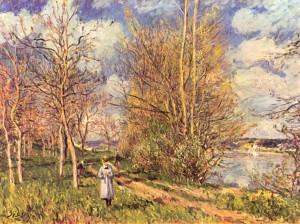Many years ago, I went through a phase of writing down all my dreams. I quickly got much better at remembering them, to the point where writing down a night’s dreams could take an hour or more and was becoming quite a chore. And then a weird thing happened: I began to dream about writing down my dreams. After a long and complicated dream, I would write it down, feel relieved that the chore was done, and then wake to find that not only did I have to write down the initial dream, but the bit about writing it down as well. The act of writing about the dreams, I realised, had changed the character of the dreams themselves, and I abandoned the project.
* * *
In this short article, I included the following quote from a book review by Rachel Cusk:
How does the novel become new again? One way is by its movement into fields of life not yet documented.
I’ve not read any of Rachel Cusk’s books, or anything by Jonathan Lethem who she was reviewing, but when I read this I was immediately struck by her notion that the purpose of a novel was to ‘document’ areas of life. It seemed to me an odd word and an odd conception of the function of fiction, and yet I felt I’d seen the same idea expressed in various ways many times before. And the more I thought about it, the more it struck me what a recent conception of literature that is. As I said in the article, it’s difficult to imagine that Shakespeare was trying to document anything.
Since writing the article, I’ve asked myself another question. Document for whom? Who is that looks at novels and works of literature as documentary records of their times? And the answer, it seemed to me, was academic students of literature. Of course if you study Shakespeare, or Jane Austen, or Virginia Woolf as an academic exercise, you inevitably read their work as, in part, a record of the times in which they were written, whether or not written with that intention.
EngLit as an academic subject is relatively recent, but many writers now, and particularly writers who aspire to write literature, have themselves studied it. Even if they haven’t studied it, writers who want to be admired and taken seriously are surely aware of its gaze, aware that in the long run, literature academics are often the ones who determine which works continue to be read and contine to be seen as important. And perhaps that makes ambitious writers crave the approval of that particular set of eyes? ‘If those people want to read works of literature as documentary records,’ they perhaps at some level think, ‘then documentary records are what we must write.’
Or it might equally be: ‘If stylistic innovation is what impresses them, then stylistic innovation is what I’ll give them’. My point here isn’t so much about the specific notion of literature as contemporary record, as about the way in which (as with my dreams) external observation of a process alters the character of the process itself. Literary academics enjoy intertextuality, for instance (the way one text refers to, and plays with, other texts), and I’ve certainly come across works of fiction that played with intertextuality in such an arch and knowing way that it reminded me of a child trying to impress grown ups.
My hunch is, though, that in the long-run, the great books – the ones that students of literature end up finding interesting in the future – actually won’t turn out to be the ones that played too much to that particular gallery. After all, whether intentionally or not, any book is a document of its times and any book includes resonances, shadows and borrowings from other works, so, with or without self-conscious gallery-playing, there will always be things for the literary studies people to explore. And the great books of the past were written without having to consider that particular gaze.
“An academic-led literature is a gentrified suburb,” wrote the Australian poet, Les Murray, and I’m inclined to agree with him. Gentrified suburbs tend to be pretty and nice to live in, but, with their self-consciousness, their inhibitions, their niggling social anxiety, no one would call them the most exciting places on Earth.

